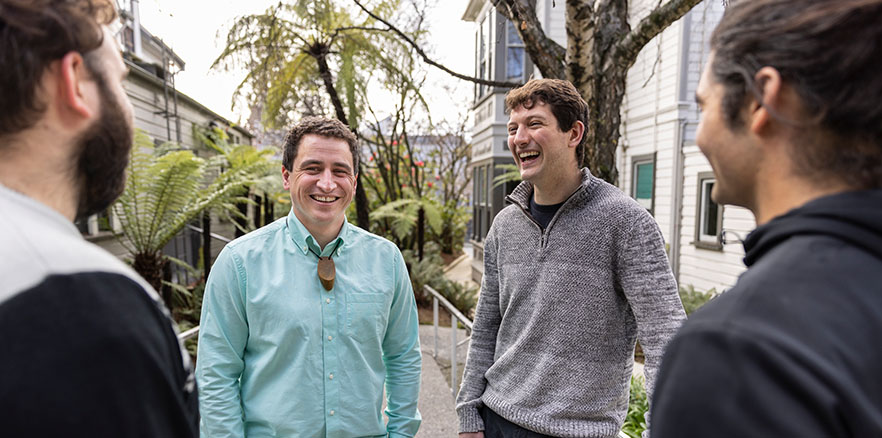
Dr Hitaua Arahanga-Doyle (second from left)
The desire to “give back” has been a driving force for Psychology Lecturer Dr Hitaua Arahanga-Doyle (Ngāi Tahu, Te Āti Haunui a Pāpārangi).
“My undergrad experience was all over the place. In fact, I changed my degree six times,” he says.
“During that time my awesome whānau helped me a lot, but also groups such as my iwi – Ngāi Tahu – gave me scholarships and work experience, so I really felt like I needed to give back.”
Arahanga-Doyle graduated with a BCom in Marketing and a BA in Psychology from the University of Otago in 2013 and 2014 and returned in 2016 to complete a one-year honours programme in Psychology.
“It feels a bit clichéd but the biggest reason I returned was that I wanted to help people, in particular adolescents and young Māori students. That one year turned into a five-year PhD, which I graduated with in 2021.”
Arahanga-Doyle's PhD research aimed to help first-year Māori students by investigating the efficacy of a brief intervention that integrated social psychology approaches around belonging with fundamental te ao Māori cultural values, particularly whanaungatanga.
“Through my research I try to bring a te ao Māori lens into areas of Social Psychology as best as I can.”
His analysis of how students described their first-year experiences suggested Māori students were more likely to contextualise being independent as a challenge, compared to New Zealand European students who described it with a sense of expectancy.
“International research has shown how this cultural mismatch between the common independent norms of university and students can have a range of adverse effects.”
In 2019 Arahanga-Doyle was awarded a Fulbright Scholarship and chose to study at Stanford University and Northwestern University in the United States.
I joined labs at those universities because reading their work was pivotal in how I thought about and approached psychological research in this area. I admired their diligence as well as their approach in trying to use social psychology as a novel, strengths-based tool to help people elevate and improve within particular contexts rather than fixating on deficits.
Arahanga-Doyle is currently developing a new paper for the Psychology honours programme called PSYC432: Waenganui: Intersecting culture and the mind, which looks at how cultural norms, values and meanings are entangled within psychology, particularly from an Aotearoa New Zealand perspective.
He is also interested in pursuing research that integrates different ways of thinking to tackle some of the biggest challenges within the social sciences, such as education.
“A major challenge in our field is that for a long time the Western, Eurocentric lens has been the default. However, more and more research has shown this isn't always reflective of the psychology of other groups.
“Through my research I try to bring a te ao Māori lens into areas of social psychology as best as I can. I'm a big believer in [Māori researcher and health specialist] Sir Mason Durie's 'research at the interface' approach, which aims to 'harness the energy from two systems in order to create new knowledge that can be used to advance understanding'.
Recent awards
- Fulbright Scholarship (2019)
More stories about early career researchers
This story is part of the research publication 'He Kitenga 2022: Talented Futures', which presents the different pathways into research that early career researchers follow.
